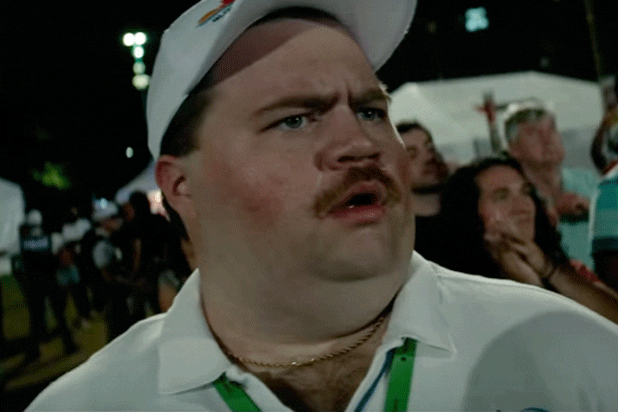
They’re a common sight around malls, retail stores, and companies these days. They help make sure things go smoothly yet are often ignored or make fun of. Of course, I’m referring to the humble security guard.
Perhaps the most infamous of all security personnel in the past 25 years has to be Richard Jewell. For the younger generation, his name is not one that will likely register as important. Director Clint Eastwood wants to change that with his latest film Richard Jewell. It is a tale of heroism, woe, and frustration that will reward the patient filmgoer and serves as a reminder of life before the world’s innocence was shattered one fateful evening.
Richard Jewell (Paul Walter Hauser) was a rather portly individual who lived in the Atlanta area and had a dream of getting into law enforcement. He was good with guns, extremely good at remembering things, but absolutely lousy in people to people relationships. His track record wasn’t the best either, partially due to the people he was trying to protect making fun of or simply ignoring him.
At the opening of the film, Jewell’s trying to make ends meet as a supply clerk in a law firm. He encounters Watson Bryant (Sam Rockwell), a no-nonsense lawyer who doesn’t take anything from anyone, including elected officials. The two briefly get to know each other over candy bars and a discussion in a video arcade before Jewell takes another job, this time as security detail at the 1996 Summer Olympics in Atlanta. There, he helps protect a music venue inside Centennial Park, the hub of action outside the sporting venues.
All is well for the first few concerts until one fateful evening when Jewell spots a suspicious backpack under a bench near the sound and lighting tower. He calls the police over to check (this is an international event, after all) and begins getting people out of the way. Suddenly the backpack explodes, raining fire and shrapnel throughout the park. Two people were killed and over 100 injured, transforming the capital city of Georgia instantaneously. Jewell goes home that evening, content that he helped keep the situation from being significantly worse.
The next day, he discovers that his observation and quick thinking has won him fame in the eyes of the world. People want to talk to him on television, people cheer when they see him, and he becomes an instant celebrity. Meanwhile, the FBI begins to look into who planted the backpack and called 911 with a warning about the bomb. They don’t have any real leads, but after acquiring information from Jewell’s past, they suddenly begin to think he was the culprit, doing it for fame and notoriety. With that, Richard’s quiet lifestyle (he lives in an apartment building with his mother [played by the always excellent Kathy Bates]) is completely shattered as the FBI does everything possible to make him the world’s biggest enemy.
Usually such situations are kept fairly quiet. However, Kathy Scruggs, a rather arrogant and pushy reporter from the Atlanta Journal newspaper (played with realistic smarminess by Olivia Wilde) is able to coerce one of the FBI detectives to inform her who they’re going after. They have a paper to print, you know. When she finds out, she makes the FBI’s intentions known to the world.
Cue circus music.
Jewell suddenly cannot move more than 15 feet without a reporter yelling questions at him or hearing the shutters of cameras go off. He doesn’t know what to do. At this point, he reaches for the one person who might be able to help him–the lawyer he stocked with candy bars a few months earlier. Since then, Watson Bryant has gone into his own practice and decides to help the poor guy out. The question is whether the mass of humanity descending on Jewell or the FBI will destroy him first.
Richard Jewell is a film that, for me, hit very close to home. You see, I was at Centennial Park a few hours before the bomb exploded. I played in the fountains and snapped a few 35mm pictures before heading back to South Carolina. That night, my friends and I huddled around a television set, aghast at the video news outlets were showing of the aftermath and thankful to God that we left when we did. I also distinctly remember the media’s evisceration of Jewell and how he was made to look like had the whole bombing planned (in reality, Eric Rudolph confessed to it a few months later). I remember feeling sorry for the guy but had no idea how much his life changed as a result of the FBI and media. Of course, the film shows Jewell as an avid owner of guns and is extremely knowledgeable about security–things the FBI used against him. Bryant tells him to not say anything, but he keeps talking (since he’s so big into law enforcement), making things worse on everyone around him. It’s only after he realizes how the ordeal has hurt his mother that he finally gets the nerve to confront the FBI directly.
As for the film itself, it’s very good and has some incredible acting. Bates was nominated for a Golden Globe recently for her role as Jewell’s mom Bobi. Hauser and Rockwell are great in their individual roles but magical when they share the screen. You see and feel their relationship build, change, and eventually transform each other. Munn seems to me to be the weak link, but after giving it some thought, she adds a necessary layer to transform the film from ho-hum to must-see. And this is a film that deserves to be seen and its voice heard for past, present, and future generations.
That evening in Centennial Park, anyone off the street could walk in–there were police around, but no layer of security other than presence. One week later, I returned to Atlanta to see a handball match and found a completely different city. There was a feeling of nervousness everywhere. Security was beefed up considerably. In fact, in order to visit the park again, I had to go through two separate bag checks. The innocence was gone, never to be reclaimed again.
At one point on this planet, there was innocence and no need for protection. Adam and Eve were sinless at first, having their pick of whatever they wanted to do and to eat. Sure, God warned them not to eat from one specific tree, but there was no security guard around for enforcement. When they finally gave in and tasted of the forbidden fruit, things changed. The innocence was lost. God, after a stern lecture, kicked them out of Eden–and added security detail in the form of a flaming sword so they could never get in again. Sin is costly, but it doesn’t have to rule in us thanks to Jesus and his birth, life, death, and return to life once more. He’s ready to forgive all those who call on him to do so.
Make sure you put Richard Jewell on your must-see list this year. It’s thrilling, harrowing, and a sobering reminder of innocence lost–both individually and as a society.
Special features include both “The Real Story of Richard Jewell” and “The Making of Richard Jewell” with many of the principles (Eastwood, Hamm, Rockwell, Bates, etc.) included.





